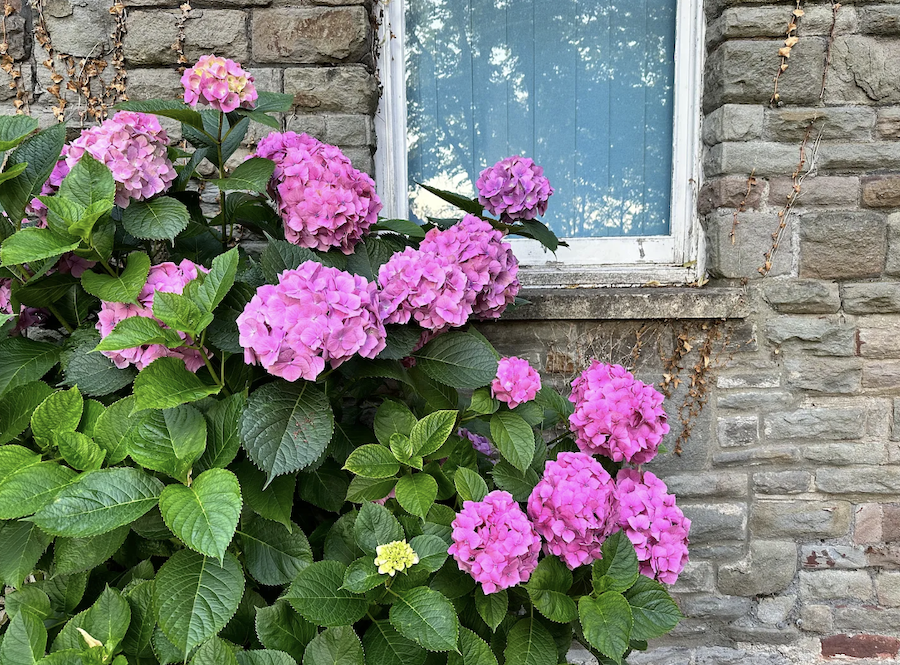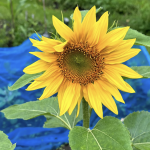On re-authoring our stories in the digital age
Good morning, I hope this finds you well. I am writing this sitting at a bedroom window, listening to the wind and soft rain in Three Sisters, the tall trees we are blessed with here. It’s a wet and warm weekend in Bristol. I am super excited about a friend visiting us today from Switzerland, so I am also fidgety, just like Nature today. Movement is good, though, and it’s nice to use Nature for metaphors that help self-reflection and morning emotional check-in with ourselves.
It’s the time of the year when it is possibly quite challenging to capture everything that is happening around us. Summer and autumn blend in in the U.K., and now, during the climate crisis, even more so. I already had my first blackberries – for almost a week, while our tomatoes and cucumbers were only just forming. Peas are finishing, and carrots and beetroot are only just maturing. Hazel and elderflower undergo the ritual of losing their fruits pre-maturely to birds and squirrels, which to my neoliberal mind feels like a waste, and to my Nature-connected mind feels understandable – we took so much from animals: land for homes, safe passages for roads and heavy traffic, hedges for fences and meadows for perfect grass lawns. So I sit with mixed feelings: the dread of what we have and continue doing (and haven’t learned much during the early COVID-19 years), the hope that Nature knows better and will sort it out (and us if needed), and always arrive to the more immediate reality: I am here, and I am doing my part to learn, notice and to cultivate. Every single action of mine that supports Nature matters. And so I am so excited that our allotment finally looks Nature-friendly. Yes, we are now picking peas, beans, beets, carrots, fennels, spaghetti squashes, courgettes, potatoes, apples…and we offer two ponds, two trees with sheltered spaces, rows of hedges and pollinating flowers everywhere you can squeeze them in. A new allotment neighbour stopped me once and said, “Your plot looks ever so relaxing,” and I took it as a complement to this very mission – to make it relaxing for all the living creatures there. Yesterday, I noticed a sign of a fox presence in our greenhouse – it is open and completely overgrown by tomatoes, and cucumbers grew from seed and allowed to spread wildly. I am glad that this space provides shelter for them, too. Gardening is not a trend or self-care; it’s a responsibility. We each and all owe this to Nature.

There are so many different ways of promoting love to Nature. At the office where I work part-time, the estate hires fantastic gardeners who love tinkering away, and so now and again, we get to see incredible results – beautiful trees, pampered orchards, nurtured hedges, and so many birds still. I saw more butterflies there in one day than at home during the entire summer so far.

And there is bringing the Nature into the city. I went for a walk with my child last week across Gloucester Road. It was disproportionately much hotter there in comparison to our local Fishponds, and we noticed only a slight stretch of trees. Trees cool down the pavement (so needed at the moment!) and the entire area, so it is a pity that most of the road is ever so bare; we needed to take two layers off to feel okay. So it was nice to pop into the Wild Leaf Garden Centre – a lovely local space promoting all things green with a lush twist (and a fantastically designed website, too;)). I still think about why we sometimes pay so much for plants – we cannot put a price tag on Nature. And then I remember that if this is how we can bring more love for our planet into our homes and cities, why not? Every step we take to experience and model Nature Connectedness matters.

Connecting with Nature improves individual and collective wellbeing, of course. However, more is at stake here. Every small act of growing, planting seeds and cultivating our love for Nature brings us closer to preserving it for ourselves and future generations.
Reflection
Today, I invite you to consider the power of agency given to us in the age of social media. We hear a lot about the toxicity and algorithmic injustice of those digital platforms, which we do have to hold in mind and review critically, of course. However, today, I would like to focus more on the very basic idea of planting seeds of change with every single post we share. In liberation psychologies, we call this re-authoring for liberation. Unlike ever before, we live in the digital age, which allows anyone with small resources and a good sense of agency to post, publish, and collaborate around their stories. Our voice on those platforms matters now more than ever. So let’s explore how we can do it through a reflection:
Q: How do you use your voice on social media platforms? What are your individual goals for specific channels? Do you post to…document your story, learn, educate, entertain, inform, dismantle, question, validate, to… – make a list of verbs and see what comes up. When you finish your list, add another few rows and see if you can fill those up too.
Q: What types of content do you share? What do you talk about, and what do you re-share? Every post you make, or re-reshare creates our overall web shadow, so if we were to add up all your posts together, what would your story tell us about you, your roots, and your direction? What is your account telling us about you?
Q: What is your MAIN personal goal for posting and maintaining a profile on each platform? We may think we do not have a strategy, so let’s think about this briefly: do you post to connect with friends and family? Why do you post?
Q: What would you like to change, shift, adjust, move towards in your posting habits? What would you like to do to own your story more and shape your narrative to align with your inner values more?
Remember, while we all worry about the future of Twitter or Threads, we also need to hold in mind the power of a single tweet to change the world – our world, your world, your friend’s world – for the better. Because if we don’t hold that power, we give it up.
(I am off to prepare for a lush day with a friend, and so I wish you a soft Sunday!)
This post was originally posted on Substack in our Syl’s Liberation Psychologies Newsletter.

